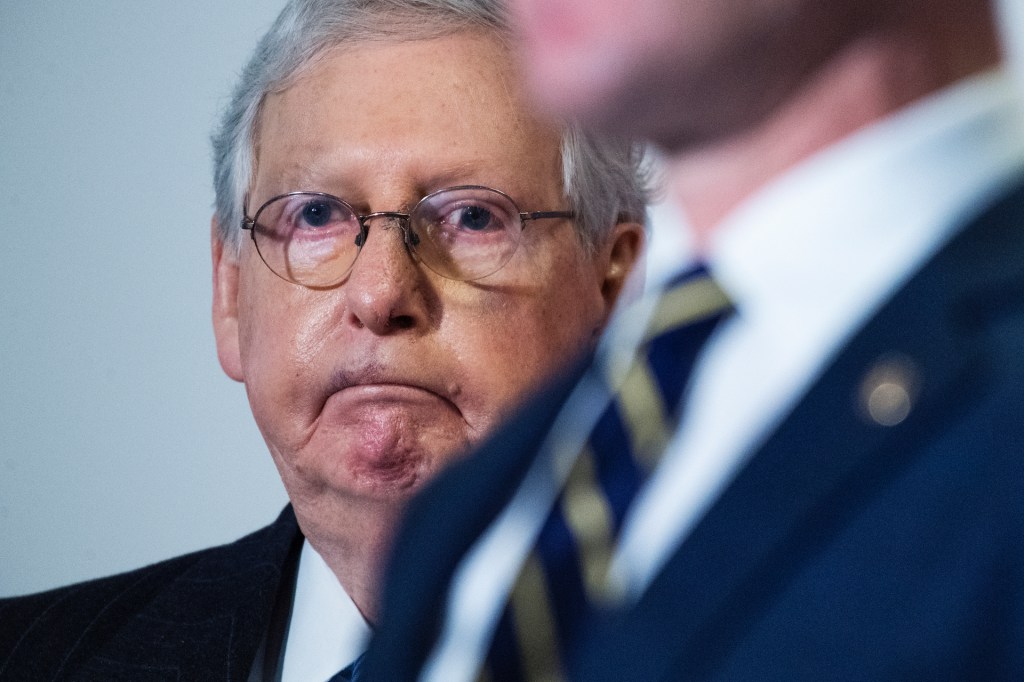Want the best of VICE News straight to your inbox? Sign up here.
It’s looking increasingly unlikely that struggling Americans will see any sort of real stimulus bill before Election Day, despite optimism from White House officials and House Speaker Nancy Pelosi on Wednesday.
Videos by VICE
For months, Pelosi and the White House have squabbled over the details and cost of a massive COVID-19 relief package that’s urgently needed to help people and businesses make it through the pandemic. Now that both sides are saying they’re closer than ever to reaching a deal, Senate Majority Leader Mitch McConnell is apparently threatening to stand in the way. He reportedly advised the Trump administration against any agreement before Nov. 3, in part because it could divide Republicans and interfere with next week’s plan to confirm Judge Amy Coney Barrett to the Supreme Court, according to the New York Times.
McConnell has thrown his support toward a more targeted pandemic relief bill that would cost about $500 billion—a significantly lower price tag than either the White House or Democrats are currently willing to consider. That package, crafted by Senate Republicans, failed to pass the Senate on Wednesday.
For her part, Pelosi has stuck by her party’s $2.2 trillion proposal, for which there is widespread public support. The White House, which pitched more than $1.8 trillion in an offer this month, seems willing to edge closer to Pelosi’s price tag, since President Donald Trump recently said he wants an even larger package than what’s been offered and can somehow get McConnell to agree to the gigantic cost.
Pelosi said Sunday that if a deal were to take place before Election Day, Treasury Secretary Steven Mnuchin would have to agree to it by Tuesday. That didn’t happen. The two were scheduled to continue their negotiations Wednesday afternoon.
Many provisions of the bipartisan CARES Act, which was passed in March, have either expired or will expire by the end of this year, including an extra $600-a-week unemployment benefit, a pause on student loan payments, expanded unemployment insurance for gig workers, and greater paid sick and family leave.
If some sort of relief bill isn’t passed soon, the prospect of new stimulus checks, business loans, and expanded unemployment benefits could be left to the lame-duck session that’ll occur after the November elections and before a new Congress begins in January. How further negotiations will be accomplished in what’s sure to be a volatile election cycle is unclear.
While both White House officials and Pelosi’s office said the two parties were progressing in their deal talks, Chief of Staff Mark Meadows told CNBC Tuesday that the negotiations nonetheless had “a ways to go.”
Meadows clarified in an interview with Fox Business Wednesday that everyone was hoping to reach a deal before the end of the week. White House spokeswoman Alyssa Farah also said Wednesday that she felt it was possible to come to an agreement within the next 48 hours. And Pelosi said she was feeling optimistic in an interview with MSNBC.
But even if the two sides reach a deal in the next few days, passing it before Election Day poses another big challenge.
Pelosi told MSNBC Wednesday that even if McConnell doesn’t consider a deal before Nov. 3, legislators can nonetheless have a package ready to go—with retroactive benefits included—for whenever he’s willing to come to the table.
But Trump is raring to get a bill signed now. He quickly reversed course after attempting to call off deal talks on Twitter this month to instead direct attention toward Barrett’s confirmation, which sent the stock market lower. Trump, who typically performs well with voters on economic issues, has also recently lost a bit of that ground to Biden, according to a survey released by Morning Consult/Politico on Wednesday.
Political repercussions aside, the consequences of not passing an immediate deal are most dire for American households. Eight million Americans recently fell into poverty, thanks to congressional inaction.
More
From VICE
-

Photo: janiecbros / Getty Images -

Photo: NATALIA ANDREEVA / Getty Images -

(Photo by John Nacion/Variety via Getty Images) -

Illustration by Reesa
